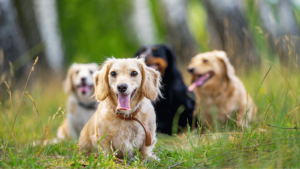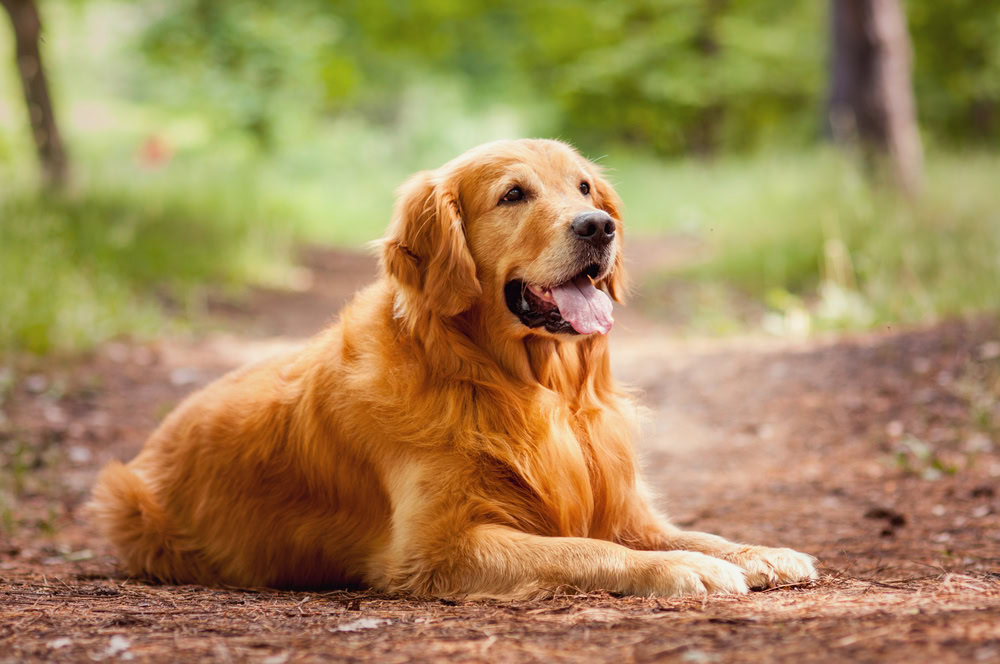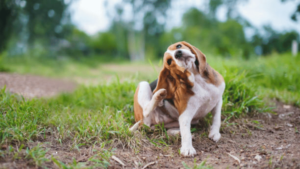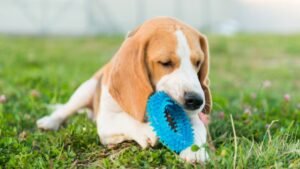






Golden Retriever Care Guide are one of the most beloved dog breeds, known for their friendly nature, intelligence, and affectionate temperament. They are excellent family pets, therapy dogs, and service animals, making them a versatile and loving breed. However, Golden Retrievers require proper care, training, and attention to stay happy and healthy.
This guide will provide everything you need to know about caring for a Golden Retriever, covering nutrition, exercise, training, grooming, and health care tips to help your furry companion live a long, joyful life.

A well-balanced diet is essential for maintaining energy, muscle strength, and coat health in Golden Retrievers. They are active dogs with a strong appetite, so proper portion control is important to prevent obesity.
✔ Protein (22-28%) – Supports muscle growth and overall body function (chicken, beef, fish, lamb).
✔ Healthy Fats (10-15%) – Maintains coat shine and skin health (salmon oil, flaxseed).
✔ Complex Carbohydrates – Provides sustained energy (brown rice, oatmeal, sweet potatoes).
✔ Fiber – Aids digestion and prevents bloating (pumpkin, vegetables).
✔ Calcium & Phosphorus – Essential for strong bones and teeth.
✔ Glucosamine & Chondroitin – Supports joint health and prevents arthritis.
🐾 Puppies (8 weeks – 6 months): 3-4 meals per day.
🐾 Adults (6 months – 7 years): 2 meals per day.
🐾 Seniors (7+ years): 1-2 smaller meals with joint-supporting supplements.
Avoid overfeeding and high-fat treats, as Golden Retrievers are prone to weight gain and joint issues.

Golden Retrievers are energetic, playful dogs that require daily exercise to maintain their physical and mental well-being. Without enough activity, they may develop boredom-related behavioral issues such as excessive chewing or digging.
✔ At least 1-2 hours of exercise per day.
✔ Daily walks or runs to burn energy.
✔ Fetch and swimming (Goldens love water!).
✔ Agility training and interactive games to keep them engaged.
Regular exercise helps prevent obesity, joint problems, and destructive behavior.
Golden Retrievers are highly intelligent and eager to please, making them one of the easiest breeds to train. They respond best to positive reinforcement methods such as treats, praise, and playtime.
✔ Start training early—basic commands like “sit,” “stay,” and “come” should be taught from puppyhood.
✔ Use positive reinforcement to encourage good behavior.
✔ Socialize early with people, dogs, and different environments.
✔ Leash train to prevent pulling during walks.
✔ Discourage jumping by rewarding calm greetings.
Golden Retrievers thrive on mental stimulation, so incorporating obedience training, problem-solving games, and new challenges keeps them engaged.
Golden Retrievers have a beautiful, thick double coat that requires regular grooming to prevent matting and excessive shedding. Their coats help regulate body temperature, so they should never be shaved.
✔ Brush at least 3-4 times a week to remove loose fur and prevent tangles.
✔ Bathe every 6-8 weeks using a mild, dog-friendly shampoo.
✔ Trim nails every 3-4 weeks to avoid discomfort.
✔ Clean ears weekly to prevent infections.
✔ Brush teeth 2-3 times per week to prevent gum disease.
In shedding seasons (spring and fall), daily brushing helps manage fur around the house.

Golden Retrievers are generally healthy, but they are prone to specific genetic and lifestyle-related health conditions.
✔ Hip & Elbow Dysplasia – Joint malformation that causes pain and mobility issues.
✔ Obesity – Due to their love for food, weight control is essential.
✔ Ear Infections – Their floppy ears trap moisture, leading to bacterial infections.
✔ Allergies & Skin Conditions – Goldens may have food or environmental allergies.
✔ Heart Disease – Some Goldens develop heart conditions like subaortic stenosis.
✔ Cancer – Golden Retrievers have a higher risk of developing cancer as they age.
✔ Maintain a healthy weight with a proper diet and exercise.
✔ Feed joint-supporting supplements (glucosamine & chondroitin).
✔ Clean ears regularly to prevent infections.
✔ Provide a high-quality diet to reduce allergy risks.
✔ Schedule routine vet checkups for early disease detection.
Regular health monitoring and early intervention can significantly improve your Golden Retriever’s lifespan and quality of life.
Golden Retrievers are friendly, social dogs that thrive in family environments. However, proper socialization is essential to prevent anxiety and fearfulness in new situations.
✔ Introduce them to different people, places, and sounds at a young age.
✔ Enroll in puppy socialization classes for structured interactions.
✔ Expose them to new experiences (car rides, vet visits, other pets).
✔ Reward calm behavior in unfamiliar environments.
A well-socialized Golden Retriever is confident, friendly, and adaptable.

As Golden Retrievers age, they may slow down and require extra care. Common aging concerns include joint stiffness, weight gain, and reduced energy levels.
✔ Switch to a senior diet with joint-supporting nutrients.
✔ Provide orthopedic beds for joint comfort.
✔ Keep up with gentle exercise like swimming or short walks.
✔ Increase vet checkups to twice a year to monitor aging-related conditions.
With proper senior care, Golden Retrievers can remain active and happy well into their golden years.
Read More : How Healthy Pet Food Delivery Can Transform Your Pet’s Diet
Why Choose Human Grade Pet Food? Benefits of Subscription Service for Dogs & Cats
Golden Retrievers are loyal, loving, and intelligent companions that thrive with proper nutrition, exercise, training, and medical care. By providing consistent care and affection, you can ensure your Golden Retriever lives a healthy, joyful, and fulfilling life.
✔ Feed a balanced diet for energy and coat health.
✔ Ensure daily exercise to maintain a fit and happy dog.
✔ Train with positive reinforcement for a well-behaved companion.
✔ Groom regularly to prevent matting and shedding issues.
✔ Stay on top of health checkups for early disease detection.
With love and proper care, your Golden Retriever will be a cherished member of your family for years to come!
Golden Retrievers need at least 1-2 hours of daily exercise to stay healthy and happy.
A high-protein, balanced diet with lean meats, healthy fats, and essential vitamins.
Brush them 3-4 times a week and bathe them every 6-8 weeks.
Yes! They are highly intelligent and eager to please, making training easy with positive reinforcement




